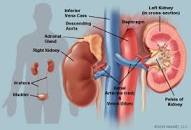
Diagnosed with Cancer? Your two greatest challenges are understanding cancer and understanding possible side effects from chemo and radiation. Knowledge is Power!
Learn about conventional, complementary, and integrative therapies.
Dealing with treatment side effects? Learn about evidence-based therapies to alleviate your symptoms.
Click the orange button to the right to learn more.
- You are here:
- Home »
- Blog »
- side effects ID and prevention »
- Carfilzomib (kyprolis) Kidney Damage
Carfilzomib (kyprolis) Kidney Damage

The myeloma chemotherapy carfilzomib (kyprolis) can damage kidney health. According to research, more than 80% of newly diagnosed myeloma patients present with kidney damage.
How can carfilzomib (kyprolis) damage kidney health?
Have you been diagnosed with multiple myeloma? Do you have kidney involvement as well? If you’d like to learn more about managing your kidney health, let me know David.PeopleBeatingCancer@gmail.com
Hang in there,
David Emerson
- MM Survivor
- MM Cancer Coach
- Director PeopleBeatingCancer
Carfilzomib-associated renal toxicity is common and unpredictable: a comprehensive analysis of 114 multiple myeloma patients
“Carfilzomib (CFZ) is a non-reversible proteasome inhibitor approved for the treatment of patients with relapsed and refractory myeloma (RRMM). Its use has been associated with cardiovascular toxicity but although recently a signal of clinically significant renal complications has also been identified, it is less extensively investigated.
We analyzed data of 114 consecutive patients with RRMM who received CFZ-based regimens. Renal complications not related to MM progression were observed in 19 (17%) patients;
- thrombotic microangiopathy (TMA) was seen in 6 (5%) patients,
- albuminuria >1 gr/day in 7 patients (6%)
- and at least grade 3 acute kidney injury (AKI) which could not be otherwise explained in 6 patients (5%).
A total of 15 patients discontinued CFZ and dosing was reinitiated at a lower level in one patient with AKI. Albuminuria was associated with focal segmental glomerulosclerosis in the renal biopsy (performed in a total of 6 patients).
Renal complications during CFZ therapy are common, occur mostly early and are unpredictable. A potential effect of CFZ on the renal endothelium could be implicated in the pathogenesis of these complications and may also share common pathophysiology with cardiovascular effects of CFZ.
Efficacy of curcumin on prevention of drug-induced nephrotoxicity: A review of animal studies.
Carfilzomib-related acute kidney injury may be prevented by N-acetyl-L-cysteine
What to Know About Supplements and Your Kidneys
“Getting the right amount of nutrients is an essential part of your diet and is vital for your health. Nutrients supply your body what it needs to properly function daily, such as a boost in energy, improvement in muscles and body tissue, and even help fighting against infections. The right kind of nutrients will also help you remain at a healthy weight…”


